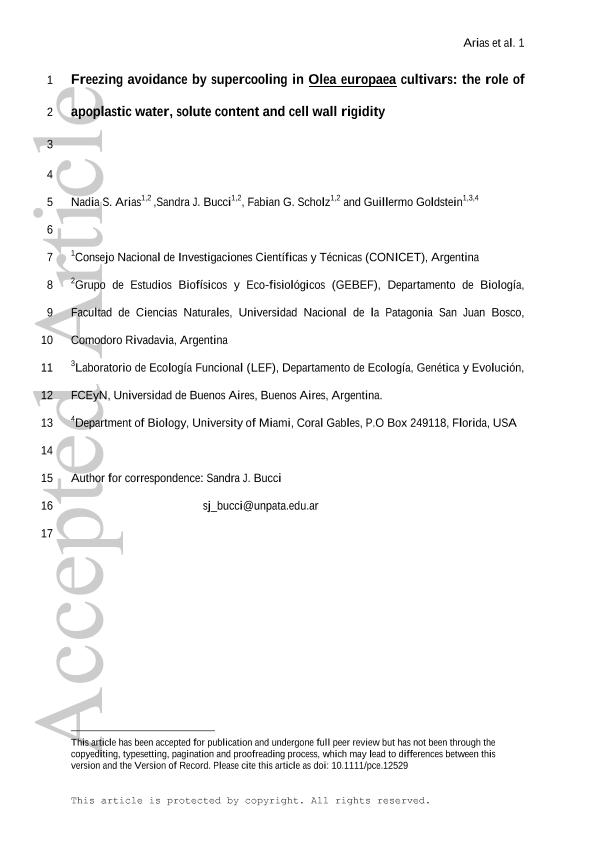Artículo
Freezing avoidance by supercooling in Olea europaea cultivars: The role of apoplastic water, solute content and cell wall rigidity
Fecha de publicación:
03/2015
Editorial:
Wiley Blackwell Publishing, Inc
Revista:
Plant, Cell and Environment
ISSN:
0140-7791
Idioma:
Inglés
Tipo de recurso:
Artículo publicado
Clasificación temática:
Resumen
Plants can avoid freezing damage by preventing extracellular ice formation below the equilibrium freezing temperature (supercooling). We used Olea europaea cultivars to assess which traits contribute to avoid ice nucleation at sub-zero temperatures. Seasonal leaf water relations, non-structural carbohydrates, nitrogen and tissue damage and ice nucleation temperatures in different plant parts were determined in five cultivars growing in the Patagonian cold desert. Ice seeding in roots occurred at higher temperatures than in stems and leaves. Leaves of cold acclimated cultivars supercooled down to -13°C, substantially lower than the minimum air temperatures observed in the study site. During winter, leaf ice nucleation and leaf freezing damage (LT50) occurred at similar temperatures, typical of plant tissues that supercool. Higher leaf density and cell wall rigidity were observed during winter, consistent with a substantial acclimation to sub-zero temperatures. Larger supercooling capacity and lower LT50 were observed in cold-acclimated cultivars with higher osmotically active solute content, higher tissue elastic adjustments and lower apoplastic water. Irreversible leaf damage was only observed in laboratory experiments at very low temperatures, but not in the field. A comparative analysis of closely related plants avoids phylogenetic independence bias in a comparative study of adaptations to survive low temperatures.
Palabras clave:
FREEZING RESISTANCE
,
ICE NUCLEATION
,
LT50
,
NON-STRUCTURAL CARBOHYDRATE
,
OLIVE
Archivos asociados
Licencia
Identificadores
Colecciones
Articulos(CCT-CENPAT)
Articulos de CTRO.CIENTIFICO TECNOL.CONICET - CENPAT
Articulos de CTRO.CIENTIFICO TECNOL.CONICET - CENPAT
Articulos(IEGEBA)
Articulos de INSTITUTO DE ECOLOGIA, GENETICA Y EVOLUCION DE BS. AS
Articulos de INSTITUTO DE ECOLOGIA, GENETICA Y EVOLUCION DE BS. AS
Citación
Arias, Nadia Soledad; Bucci, Sandra Janet; Scholz, Fabian Gustavo; Goldstein, Guillermo Hernan; Freezing avoidance by supercooling in Olea europaea cultivars: The role of apoplastic water, solute content and cell wall rigidity; Wiley Blackwell Publishing, Inc; Plant, Cell and Environment; 38; 10; 3-2015; 2061-2070
Compartir
Altmétricas




